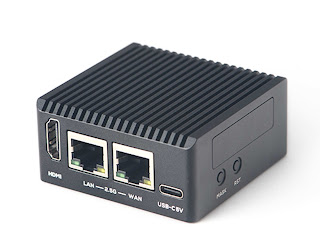Move over, Raspberry Pi—there’s a new contender in the single-board computing arena. FriendlyElec’s NanoPi R76S is making waves with desktop-class specs crammed into a palm-sized footprint. Targeting developers, homelab enthusiasts, and edge AI tinkerers, this powerhouse flexes features rarely seen in compact SBCs.
Under the Hood:
At its core, the R76S rocks a Rockchip RK3588 processor (4x Cortex-A76 + 4x Cortex-A55), but the real stunner is its up to 16GB LPDDR4X RAM—quadruple the max of a Raspberry Pi 5. For I/O-heavy tasks, it boasts dual 2.5 Gigabit Ethernet ports, perfect for firewalls, NAS builds, or network clustering. Storage won’t bottleneck you either, with PCIe 2.0 NVMe SSD support and a microSD slot.
The AI ace? A dedicated 6 TOPS NPU (Neural Processing Unit) for accelerating machine vision, LLM inference, and real-time object detection—no cloud dependency needed. "It’s built for workloads where Pis traditionally tap out," notes embedded systems engineer Lena Choi. "Think local Whisper transcription or 4K video analytics."
Connectivity & Extras:
- Ports: HDMI 2.1 (8K/60Hz), USB 3.0/2.0, GPIO 40-pin header
- Wireless: Wi-Fi 6 + Bluetooth 5.0
- Power: 12V/2A DC input (no USB-C)
- OS Support: FriendlyWrt (OpenWrt fork), Ubuntu, Debian, Android
Benchmarks show the R76S decoding 8K/60fps video smoothly while handling multiple Docker containers—a feat that often chokes entry-level Pis. The trade-off? A higher price: configurations start at $129 (4GB RAM) and climb to $219 for the 16GB flagship.
Early Verdict:
While less beginner-friendly than Raspberry Pi’s ecosystem, the R76S excels as a "pro" alternative for networking, AI prototyping, or lightweight server duty. Its dual Ethernet ports alone make it a compelling pfSense/OPNsense box.
👉 Ready to dive deeper?
- Official specs & documentation: FriendlyElec NanoPi R76S
- Pre-order (16GB model): Check availability on Amazon
What’s next? FriendlyElec hints at an R76S Pro with SATA ports later this year. For now, this board proves that "Raspberry Pi alternatives" aren’t just clones—they’re pushing boundaries.
^(Disclosure: This post contains affiliate links. Tech Pulse Daily may earn a commission on purchases.)

